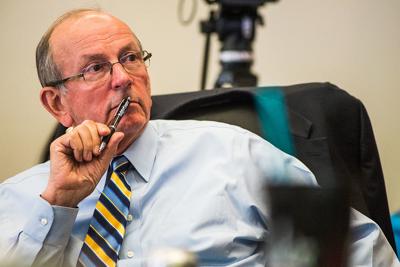After months of discussion, Columbia City Council has approved an extensive update to its smoking ordinance, prohibiting the use of e-cigarettes in places — like bars and restaurants — where traditional smoking was already banned.
Council unanimously passed the new smoking measure on May 7. Talks about adding vaping to the smoking ban, spurred by at-large Councilman Howard Duvall, had been swirling since January.
The use of e-cigarettes — such as the popular Juul devices — has increased dramatically nationwide in recent years. The city's previous smoking ban was authored in 2006.
The newly passed city ordinance defines smoking as "inhaling, exhaling, burning, or carrying any lighted or heated cigar, cigarette, pipe, hookah, or any other lighted or heated tobacco or plant product, or liquid, gel or substance in any form, intended for inhalation," and that it also would include "the use of an electronic smoking device which creates an aerosol or vapor." It bans smoking and vaping in any workplace in the city and at all city-owned facilities and properties.
When reached by Free Times, Duvall also points out that the new law expands the areas in the city in which smoking is banned. For instance, smoking and vaping are now prohibited at outdoor public events in the city. Duvall cited the popular Soda City Market and the annual Hip-Hop Family Day concert, both on Main Street, as examples of events where smoking and vaping are now outlawed.
"Mostly for smoking, it has kind of become accepted practice not to smoke when there are other people around," Duvall says. "But this will codify that. Some of the public places that have not [previously] specifically been outlawed from smoking, but where over the years it has sort of been the custom not to smoke, like Soda City, will now become a public event where you cannot, by law, vape or smoke."
The new smoking ordinance also outright bans smoking or vaping in hotel rooms in the city. Previously, hotels had been allowed to have up to 25 percent of their rooms as smoking units.
Duvall says he heard from hoteliers who were fine with banning smoking in all rooms.
"The original proposal that I put in had 10 percent [of hotel rooms allowed for smoking or vaping], and we got pushback from the hotel industry saying, 'No, don't allow any,'" Duvall says. "So, we did that. That shows you how public opinion has changed in 15 years."
The city's new law also exponentially increases the penalty for violating the smoking ordinance. Previously, there was a $25 fine. Now there will be a three-tiered penalty system. The first offense is $100, the second offense is $200 and any subsequent offenses will carry a fine of $500.
"So, if we have to enforce it, it's going to be more than just a $25 slap on the wrist," Duvall notes.
The use of e-cigarettes — which deliver nicotine — has exploded, particularly among teens. For example, according to the SC Department of Health and Environmental Control’s 2017 South Carolina Youth Tobacco Survey, the percentage of high school students currently using e-cigarettes has eclipsed those using traditional cigarettes, 13 percent to 12 percent. It marked the first time vaping had surpassed traditional cigarettes among that age group.
Duvall says that rise in use by teens is part of what led to his push to add vaping to the city's smoking ban.
"The vaping has become such an addictive craze for the teenagers," Duvall says. "When you see such an increase in [vaping] among people still in high school, it was time to do something."
Vaping and e-cigarettes have been a hot topic in the Midlands this year, and not only because of the city's push to ban vaping in workplaces and elsewhere. It's also become an economic development issue.
As noted by The Post and Courier, Juul is considering opening a manufacturing facility in the Midlands, near the Columbia Metropolitan Airport. State officials have said the company could employ more than 800 people at the facility, while anti-smoking activists are worried about the clout and influence Juul could wield if it had a plant in the Palmetto State.







